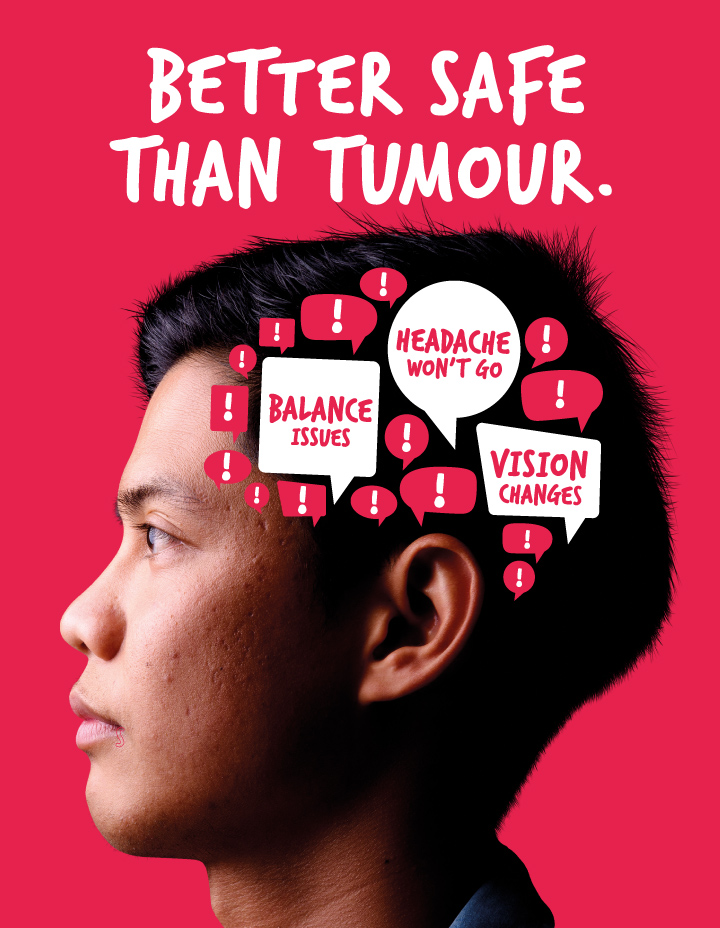Nausea and vomiting in children
Nausea and vomiting is something that many children experience as part of a minor illness and most of the time it will not be a symptom of a brain tumour. But, brain tumours can sometimes cause nausea and vomiting, so it’s good to know the signs to look out for.

On this page, we’ll cover:
- What causes nausea and vomiting in children?
- When might nausea and vomiting in a child be a symptom of a brain tumour?
- Other symptoms of brain tumours in children
- I think my child may have a brain tumour, what should I do?
Other symptoms
Use our Better Safe Than Tumour symptom checker to check for other brain tumour symptoms.
Talking to your doctor
Learn more about how to approach your GP.
Get your free Information Pack
Our Brain Tumour Information Pack can help you better understand your diagnosis and feel confident talking to your medical team.
What causes nausea and vomiting in children?
There are a few causes of nausea and vomiting in children. Some of these are:
- Gastroenteritis, or a ‘stomach bug’: this gut infection can lead to vomiting and diarrhoea
- Food allergies: nausea and vomiting could be among the symptoms of a food allergy
- Food poisoning: nausea and vomiting can be caused by eating contaminated food
- Illness: common illnesses like the flu can cause children to feel sick or be sick
When might nausea and vomiting in child be a symptom of a brain tumour?
If your child is regularly experiencing nausea (feeling sick) and vomiting (being sick) and has other brain tumour signs or symptoms, you should make an appointment with your GP as soon as possible.
Signs to look out for:
- your child is experiencing nausea and vomiting regularly, on most days
- it wakes your child up, or occurs when they wake up
- your child does not have diarrhoea or a high temperature
- your child also has a headache.
Sometimes young children might have trouble explaining how they feel so you might notice visual signs such as they have gone off their food or are holding their stomach.
If you’re concerned about your child you should make an appointment with a GP as soon as possible.
Other symptoms of a brain tumour in a child
Often, nausea and vomiting aren’t the only symptoms of a brain tumour in children. Other symptoms that might be noticeable if your child has a brain tumour are:
- Headaches
- Excessive thirst
- Changes in vision like blurred or double vision
- Seizures or fits
- Reduced consciousness
- Trouble balancing or difficulties with motor skills
- Changes in behaviour like tiredness and reduced energy
- A tilted head or stiff neck
- Delayed puberty
- Slow growth
I think my child may have a brain tumour, what should I do?
Brain tumours are rare. But, if you’re worried and a symptom persists or if your child has more than one symptom of a brain tumour then:
-
Talk to your doctor
GP appointments are usually quite short, so make sure you find out how to best prepare for your child’s appointment. - Get an eye test
If your child’s symptoms are limited to changes in vision and/or headaches, get their eyes tested by an optician before seeing your GP. - Go to A&E
If the symptoms are sudden or severe, you should go to your emergency department or call 999.
If you are concerned about your child and would like to find out more about their symptoms, you can use the symptom checker on our Better Safe Than Tumour site.
In this section

Know the Signs and Symptoms
Although brain tumours are rare, if you or a loved one are experiencing two or more of the signs and symptoms it’s important that you speak to your doctor to rule out a brain tumour.
Share your experiences and help create change
By taking part in our Improving Brain Tumour Care surveys and sharing your experiences, you can help us improve treatment and care for everyone affected by a brain tumour.